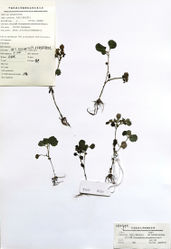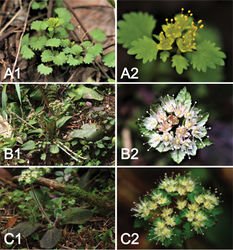Chrysosplenium zhouzhiense
| Notice: | This page is derived from the original publication listed below, whose author(s) should always be credited. Further contributors may edit and improve the content of this page and, consequently, need to be credited as well (see page history). Any assessment of factual correctness requires a careful review of the original article as well as of subsequent contributions.
If you are uncertain whether your planned contribution is correct or not, we suggest that you use the associated discussion page instead of editing the page directly. This page should be cited as follows (rationale):
Citation formats to copy and paste
BibTeX: @article{Fu2020PhytoKeys159, RIS/ Endnote: TY - JOUR Wikipedia/ Citizendium: <ref name="Fu2020PhytoKeys159">{{Citation See also the citation download page at the journal. |
Ordo: Saxifragales
Familia: Saxifragaceae
Genus: Chrysosplenium
Name
Chrysosplenium zhouzhiense Hong Liu sp. nov. – Wikispecies link – Pensoft Profile
Diagnosis
Most similar to Chrysosplenium macrophyllum and C. zhangjiajieense from which it differs by having a shorter stem, rhizome absent, basal leaf absent, sterile branch arising from flowering stem, light yellow flower with longer stamen.
Type
China. Shaanxi: Niguhe Village, Zhouzhi County, Xi’an City, 34°01'44"N, 107°58'12"E, under broad-leaved forests in a mountain area at ca. 1350 m altitude, 10 May 2020, Hong Liu, De-Qing Lan and Wen Huang HSN13356 (holotype HSN; isotypes HSN, IBK).
Description
Perennial herbs, 5–16 cm high. Root fibrous and soft. Stolons 1–3, filiform, without long creeping rhizome or bulbs. Flowering stem(s) erect, simple, 5–15 cm high, smooth and subglabrous at base, dark red, rounded. Sterile branch 1 or (2), arising from the lower part and 2–7 cm above the base of flowering stem, rounded, 5–13 cm long, upper-middle part densely covered with white villose, hairs ca. 2–3 mm long. Basal leaves absent. Cauline leaves of flowering stem 2–4, alternate, slender, petiole 10–25 mm long; blade 5–12 × 7–15 mm, flabelliform or subrounded, sparsely white villose or subglabous, apex rounded, margin obtusely dentate (10–13 teeth), base cuneate to subcordate. Leaves of sterile branches 4–8, alternate, heterophyllous, upper leaves 3–4 crowded at stem apex larger, petiole 5–15 mm long, covered with soft downy hairs; blade 10–30 × 10–30 mm, flabelliform, densely lanate at both surfaces, apex subtruncate to rounded, margin undulate-crenate (12–16 teeth), base truncate to round; lower leaves 2–4, petiole 8–25 mm long; blade 5–15 × 5–15 mm, flabelliform, sparsely pubescent or subglabrous at both surfaces, apex subtruncate to rounded, margin undulate-crenate (8–11 teeth), base decurrent. Inflorescence often 6-flowered cyme, dense, 2–5 cm wide, branches glabrous or sparsely pubescence, surrounded by leaf-like bracts; bracteal leaves green, broadly ovate or obovate, rarely rounded, smooth at both surfaces, margin or petioles sparsely villose, base slightly oblique, broadly cuneate, triangular and two-rounded arranged, unequal; middle one major, petiole 5–8 mm long, blade 5–12 × 4–12 mm, margin obtusely dentate (7–11 teeth); two lateral ones minor, petiole 2–5 mm long, blade 3–5 × 2–4 mm, margin obtusely dentate (3–5 teeth). Flowers tetramerous, actinomorphic; sepals 4 (2 pairs), erect, yellow in flowering time, but turn green in fruiting time, 2.6–3.9 × 1.8–2.2 mm, ovate, apex acuminate; stamens 8, homostylic, 6–8 mm long, twice longer than sepals; filaments slender, 6–7 mm long; anther yellow, 2-locular, longitudinally dehiscent; ovary 2-locular, semi-inferior; stigma 2, 3–4 mm long; styles erect, shorter than stamens, 2–3 mm long. Fruit a capsule, 3–4 mm long, green, smooth, 2-lobed (horn-shaped), equal, dehiscent along the adaxial suture; seeds numerous, dark brown, ovoid, a raphe on one side, 550–640 × 350–450 μm, minute papillae.
Etymology
Chrysosplenium zhouzhiense is named after the type locality, Zhouzhi County, Shaanxi Province, China.
Vernacular name
zhōu zhì jīn yāo (Chinese pronunciation); 周至金腰 (Chinese name).
Discussion
Chrysosplenium zhouzhiense is characterised by leaves all alternate, seed minute papillae, ovary semi-inferior and disc absent. Thus, it belongs to Chrysosplenium Subgen. Gamosplenium, Sect. Nephrophylloides, Ser. Macrophylla (Pan 1986a[1], b[2]). Chrysosplenium Ser. Macrophylla contains five species including C. chinense (Hara) J.T.Pan, C. davidianum Dence. ex Maxim, C. macrophyllum Oliv., C. glossophyllum Hara and a recently-described species C. zhangjiajieense (Pan 1986a[1]; Liu et al. 2016[3]). Amongst them, the new species is most similar to C. macrophyllum and C. zhangjiajieense by stamens long exserted from sepals, but can be distinguished based on plant height, rhizome, stolon, sterile branch, basal leaf, flower colour and stamen morphology as summarised in Table 1.
| Characters | C. zhouzhiense | C. macrophyllum | C. zhangjiajieense |
|---|---|---|---|
| Plant height | 5–16 cm | 17–21 cm | 13–19 cm |
| Rhizome | absent | thick | thick |
| Stolon | 1–3 | absent | absent |
| Flowering stem and sterile branch | sterile branch arising from flowering stem | separate | separate |
| Cauline leaf | 2–4 | 1 | 1 |
| Basal leaf | absent | large, 2.3–19 cm long | large, 4–10.5 cm long |
| Flower colour | light yellow | white | white |
| Stamen | 6–8 mm | 4–6 mm | 4–6 mm |
Conservation Status
At present, Chrysosplenium zhouzhiense is only known from a single locality (IUCN 2019[4]). At this locality, the population of this species comprises ca. 100 mature individuals (< 250 mature individuals, criteria D1). Therefore, we propose that C. zhouzhiense should be considered as Endangered D1 (EN) according to IUCN criteria (IUCN 2019[4]).
Key to species of Chrysosplenium Subgen. Gamosplenium Sect. Nephrophylloides Ser. Macrophylla modified from Pan and Ohba (2001)Original Description
- Fu, L; Liao, R; Lan, D; Wen, F; Liu, H; 2020: A new species of Chrysosplenium (Saxifragaceae) from Shaanxi, north-western China PhytoKeys, 159: 127-135. doi
Images
|
Other References
- ↑ 1.0 1.1 Pan J (1986a) A study on the genus Chrysosplenium L. from China.Journal of University of Chinese Academy of Sciences24(2): 81–97.
- ↑ Pan J (1986b) A study of the genus Chrysosplenium L. from China (sequel).Zhiwu Fenlei Xuebao24(3): 203–214.
- ↑ Liu H, Luo J, Liu Q, Lan D, Qin R, Yu X (2016) A new species of Chrysosplenium (Saxifragaceae) from Zhangjiajie, Hunan, central China.Phytotaxa277(3): 287–292. https://doi.org/10.11646/phytotaxa.277.3.7
- ↑ 4.0 4.1 IUCN (2019) Guidelines for Using the IUCN Red List Categories and Criteria. Version 14. Prepared by the Standards and Petitions Committee. http://www.iucnredlist.org/documents/RedListGuidelines.pdf [accessed 9 June 2020]
- ↑ Pan J, Ohba H (2001) Chrysosplenium. In: Wu Z Raven P (Eds) Flora of China (Vol.8). Science Press, Beijing, and Missouri Botanical Garden Press, St. Louis, 346–358.



